I have searched SO for this problem but was not able to find anything which would solve my problem. My problem is, I have a activity which contains FrameLayout which is constantly updated with different fragments. The top view and bottom view are going to remain same hence they are in the layout of the activity.
As you can see bottom view has a button on click of that i want to make changes in the fragments which will be present in the FrameLayout.
I have created a interface
public interface ShowFormula {
void showFormula(boolean show);
}
which i will use to implement in the fragment. Now the main problem in my MainActivity class i am trying to initialize the interface but not able to as i am getting class cast exception
showFormula = (ShowFormula) this;//yes i know this is wrong
How should i initialize this in order to communicate with the fragment. Main goal is to toggle the view in fragments on click of the button in activity.
Thanks in advance.
